|
Zodiac Killer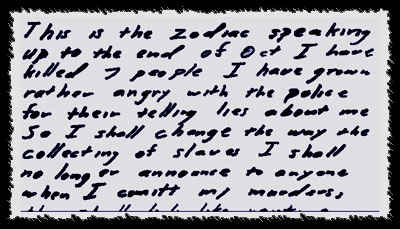 Most high-concept serial killers are the product of a deranged Hollywood screenwriter, but the Zodiac Killer was the real deal. In a killing spree that started no later than 1968 and ended no earlier than 1972, the Zodiac Killer murdered at least seven people, but in letters to San Francisco newspapers and criminal attorney Melvin Belli, he claimed the total was much higher—it was just that the authorities hadn't identified all of his victims. One of Zodiac's last letters claimed 37 kills; some estimates go higher than 50.
Most high-concept serial killers are the product of a deranged Hollywood screenwriter, but the Zodiac Killer was the real deal. In a killing spree that started no later than 1968 and ended no earlier than 1972, the Zodiac Killer murdered at least seven people, but in letters to San Francisco newspapers and criminal attorney Melvin Belli, he claimed the total was much higher—it was just that the authorities hadn't identified all of his victims. One of Zodiac's last letters claimed 37 kills; some estimates go higher than 50. Zodiac played an extremely public cat-and-mouse game with the police, sending letters and postcards, some encoded in elaborate ciphers. Nobody really knows exactly when Zodiac launched his killing spree, because you can't find four out of five experts who agree on who the first victim was.
Although this was the first attack that is conclusively linked to Zodiac, there were earlier killings which matched the M.O. to a greater or lesser extent. In 1963, two teenagers had been shot to death in Santa Barbara, several hundred miles to the south, with a small-caliber rifle. In 1968, a Riverside teen was stabbed to death by a killer who subsequently sent taunting letters to local police and newspapers. Neither case has been conclusively tied to the Zodiac Killer, but there would eventually be ample reason to think they should. The letters sent in Riverside certainly showed many elements of Zodiac's later style, although there were differences as well. A desktop in Riverside was found with a burst of poetic inspiration scratched on its surface, entitled "Sick of living/unwilling to die", which some investigators attribute to Zodiac.
Shortly after the shootings, a man called police and provided enough details to convince them he was the killer. A couple of weeks later, the killer sent
The killer did not identify himself, but signed his letters with a symbol—a circle with a cross drawn through it. He included a three-part cipher which supposedly contained the secret of his identity and demanded that each of the three newspapers publish one part on their respective front pages, threatening a dozen more murders if his request was not met. The cipher was quickly translated, but it apparently failed to disclose the identity of the killer. Instead, it presented a short, chilling exposition of the murder's psychosis, including the killer's trademark bad spelling:
I LIKE KILLING PEOPLE BECAUSE IT IS SO MUCH FUN Police tried to draw out the killer, saying that the first letters didn't provide enough detail to convince them the letter writer was who he claimed to be. The writer obliged this clumsy fishing expedition with a follow-on letter which opened with the now-infamous line: "This is the Zodiac speaking."
Zodiac struck again in September 1969, assaulting on two young adults out on a date near Napa. This time, Zodiac was more creative in his presentation. According to the victims, the killer was decked out in a costume worthy of a supervillain, with a hood covering his face and sporting on his chest the crossed-circle emblem that Zodiac used to sign his letters.
Zodiac struck again just a couple weeks later, shooting a San Francisco cab driver in the head once. This time, he broke with the pattern and took his victim's money and keys. But in a letter to the San Francisco Chronicle two days later, Zodiac claimed responsibility—and enclosed a bloody scrap of the cab driver's shirt as proof. The new letter was ominous in its tone, mocking the police for walking right past him (due to a police dispatcher's misidentification of the suspect as black). In addition to the grisly trophy enclosed in the envelope, the letter contained a threat: "Schoolchildren make nice targets. I think I shall wipe out a school bus some morning. Just shoot out the front tire and then pick off the kiddies as they come bouncing out."
Despite his newfound national celebrity, Zodiac followed the letter with a jokey postcard, including a new cipher and the ominous postscript, "could you print this new cipher on your frunt page? I get awfully lonely when I am ignored, so lonely I could do my Thing!!!!!!" The next letter came just a few days later, including a diagram of a bomb he had designed to blow up school buses and the brazen taunt, "The police will never catch me, because I have been too clever for them." Clever he might have been, but a bomb-maker he was not. The design was considered a long shot as far as the prospect it might actually work. He also warned that he would no longer announce his murders, which would henceforth appear to be routine killings, robberies or even accidents. In his characteristically bad spelling, he mocked the police for failing to catch him after the cab driver killing, "Hey pig doesn't it rile you up to have your noze rubed in your booboos?" Zodiac remained more or less true to his promise that he would no longer announce his murders, making it difficult to assess how many more lives he claimed during his active career. But he didn't stop writing letters, and the notes that continued to emerge gave some insight into his twisted psyche.
Although the letter was authenticated by the scrap of evidence, the content and format were markedly different than the previous Zodiac communiques. Earlier letters had been scrawled haphazardly across the page; this letter was carefully printed, although it contained the same erratic spelling and punctuation found in the earlier Zodiac notes. The content was even more shocking. In the letter, Zodiac asked Belli to help him stop killing. "I cannot reach out because of this thing in me won't let me," he wrote. "I am finding it extreamly dificult to keep in check." He said he was close to taking his ninth and possibly tenth victims, a figure which suggested he was indeed tied to some of the earlier murders. (If you add the 1963 and 1968 attacks to the confirmed incidents, his victim toll would have been eight at this point, but that number includes survivors.) The letter closed by saying, "Please help me I can not remain in control for much longer." Belli tried to draw Zodiac out, to no avail. As the months stretched on, the story began to cool when no new victims surfaced. A woman claimed that she and her baby were kidnapped by Zodiac, but her story was full of holes. Zodiac later claimed credit for the attack, but he neglected to provide the sort of confirming details that he had offered in previous attacks.
When San Fransciscans failed to comply with his request, he sent a follow-up letter in June that claimed to have shot a man as punishment (noting the number "12" as the apparent tally of his victims so far). The murder, if it happened, was never discovered. He would have blown up a school bus, he explained, but school was out for the summer. The letters continued, and the content became crankier and more overtly insane. In July, he wrote to the Chronicle that included a parody of the Mikado:
As someday it may happen that a victom must be found. I've got a little list. I've got a little list, of society offenders who might well be underground who would never be missed who would never be missed. There is the pestulentual nucences who whrite for autographs, all people who have flabby hands and irritating laughs. All children who are up in dates and implore you with im platt. All people who are shaking hands shake hands like that. And all third persons who with unspoiling take thos who insist. They'd none of them be missed. They'd none of them be missed.It went on for several more verses, mostly proving that Zodiac was a more gifted killer than he was a poet. The letter contained more threats of torture and mayhem, but most of these were directed at his "slaves" in "paradice," i.e., victims he had already killed, whom he planned to torment in the afterlife. Since the afterlife was outside the jurisdiction of the SFPD, no preventative action was taken.
Initially, investigators seized on the new case as part of the Zodiac canon, but they later backtracked. Police and many of the "Zodiac hobbyists" lurking on the Web and elsewhere now believe that the Riverside killings were not an authentic Zodiac case, but the similarities are hard to dismiss. After the letter to the L.A. Times (which some have assailed as a forgery), Zodiac went completely silent, for reasons unknown. In 1974, he inexplicably resurfaced with a movie review of The Exorcist, which he described as the best "satirical comedy" he had ever seen. At the bottom of the letter, he recorded a score "ME—37, SFPD—0."
After 1974, the correspondence came to a complete halt, with the exception of a couple of 1978 notes believed to be forgeries. Aside from the melodrama, there are many astonishing elements to the story of the Zodiac Killer, not least of which being the fact he was never caught or even identified, despite leaving a veritable mountain of physical evidence for investigators to work with. Dozens of fingerprints were lifted from Zodiac crime scenes and from the letters themselves, even though the killer had boasted of his precautions against such an eventuality. The prints included several blood-spattered examples which almost certainly belonged to the killer. Despite the letters, despite the prints, despite the use of potentially traceable guns, despite numerous eyewitness sightings, despite several as-yet unsolved ciphers, Zodiac has slipped away into history like a ghost. Which is not to say there haven't been suspects. Indeed, there have been many.
Allen had been fired from one elementary school teaching job for bringing a loaded weapon to school and from another for molesting a young student (a crime which he would commit again). Friends and acquaintances reported that Allen virtually confessed to being the Zodiac killer at different times, but always couching the confessions in the form of fantasies or the premise for a novel.
In 1991, a police search of Allen's home yielded a massive cache of weapons and bomb-making materials, including several weapons of the same caliber used in the Zodiac killings, as well as newspaper clippings related to Zodiac and the aforementioned watch. Despite all this, no charges were ever filed, and even after Allen's death from natural causes in 1992, police declined to identify him as the killer. Much has been written about Allen's status as a suspect, in books and elsewhere. The police investigated Allen, and any given person's view of the investigation's completeness is highly dependent on whether that person believes Allen was the killer. There's ample evidence that the investigation left much to be desired, but Allen was finally eliminated as a suspect based on two facts which are difficult to get around—the most definitive Zodiac fingerprints, taken from the bloody cab in San Francisco, did not match Allen's fingerprints, and Allen's DNA did not match the DNA of whomever licked Zodiac's stamps. While these are not quite infallible indicators, they are fairly compelling, particularly the fingerprints. It's also possible to imagine scenarios in which Allen was somehow involved in the Zodiac killings without actually committing the murders, or not all of them at least. For instance, Allen may have committed some (but not all) of the murders attributed to Zodiac. He might have been working with an accomplice, or he may have simply written the letters on behalf of the real killer. For reasons clear only to them, police have long since closed the books on the Allen investigation. But there are other suspects as well, some relatively anonymous figures who are compelling for one reason or another, including one of the lesser known members of the Manson family. Other suspects were extremely well-known but somewhat far-fetched. The most infamous Zodiac suspect was Theodore Kaczynski, better known by his supervillain name, the Unabomber. Both were homicidal Bay Area residents, and both had a tendency to seek out front page news coverage. However, this is generally considered a long shot, and forensic testing has reportedly ruled out everyone's favorite serial bomber as a Zodiac suspect. Another notorious serial killer, Ted Bundy, was considered a suspect in at least one of the Zodiac killings, but was similarly cleared. After all these years, the question of Zodiac's identity might seem academic. After all, the killer would likely be in his 70s by now, if he's even alive, and no one has heard a peep from him in decades. Furthermore, the killer may already be in prison for some other crime, which no one has happened to connect with Zodiac's spree. The question certainly seemed academic to the San Francisco Police Department, which closed its Zodiac investigation in April of 2004, under pressure to turn its attention to the city's burgeoning gang problem. Of course, the decision may have been premature. In March 2004, the Zodiac-influenced "BTK" killer suddenly resurfaced in Kansas with a letter to the media. As if on cue, in August 2004, police found a young couple shot to death on a Sonoma County beach, just 100 miles from the original Zodiac rampage. They had been shot and killed at close range. There was no sign of robbery or sexual assault—just what you might expect from a serial killer whose ego had been bruised by police indifference and a copycat grabbing all the headlines. On the other hand, Zodiac would be about 70 now, and you don't see too many 70-year-old serial killers on the post office walls. And if the killing really represents an ego-driven comeback by the one and only, it's hard to imagine Zodiac would not dash off a letter announcing his triumphant return. Who knows? Serial killers are an inscrutable lot, but none more so than the Zodiac. |
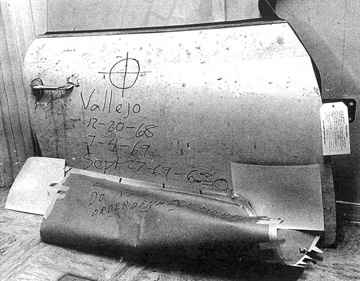 The earliest estimates point back to a 1963 murder, but the "official" first victims were David Faraday and Betty Lou Jensen, two Vallejo teenagers who were shot while parked in a secluded spot on December 20, 1968. The killer used a small caliber pistol and left no incriminating evidence behind. The killing had some unusual features, or rather it lacked the usual features associated with murder—there was no sign of robbery, no trace of sexual assault, no particular mayhem beyond what typically results from a shooting.
The earliest estimates point back to a 1963 murder, but the "official" first victims were David Faraday and Betty Lou Jensen, two Vallejo teenagers who were shot while parked in a secluded spot on December 20, 1968. The killer used a small caliber pistol and left no incriminating evidence behind. The killing had some unusual features, or rather it lacked the usual features associated with murder—there was no sign of robbery, no trace of sexual assault, no particular mayhem beyond what typically results from a shooting. 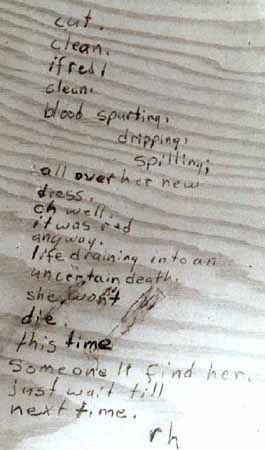 Whether or not the earlier cases were connected, the Zodiac was certainly building a portfolio back in 1969. On July 4, two more victims were shot in Vallejo, Darlene Ferrin and Mike Mageau. This time, the killer used a much larger caliber—a 9mm semi-automatic handgun. Ferrin was killed, but Mageau survived (despite taking several bullets) and provided a description which was used to produce a police sketch.
Whether or not the earlier cases were connected, the Zodiac was certainly building a portfolio back in 1969. On July 4, two more victims were shot in Vallejo, Darlene Ferrin and Mike Mageau. This time, the killer used a much larger caliber—a 9mm semi-automatic handgun. Ferrin was killed, but Mageau survived (despite taking several bullets) and provided a description which was used to produce a police sketch. 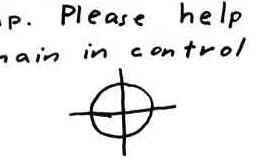 poorly-spelled letters to three local newspapers, including the San Francisco Chronicle, taking credit for the three murders in Vallejo.
poorly-spelled letters to three local newspapers, including the San Francisco Chronicle, taking credit for the three murders in Vallejo. 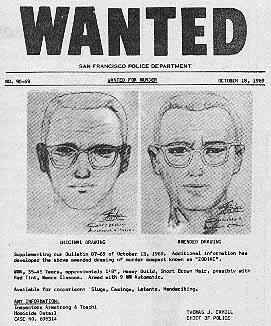 The Zodiac Killer had been officially christened. The note included more details of the killings, and closed with a complaint: "I was not happy to see that I did not get front page coverage." This problem, at least, would soon be resolved.
The Zodiac Killer had been officially christened. The note included more details of the killings, and closed with a complaint: "I was not happy to see that I did not get front page coverage." This problem, at least, would soon be resolved. 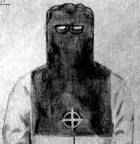 Zodiac tied up the victims, Cecelia Shepard and Bryan Hartnell, at gunpoint. Once they were bound, he produced a knife and stabbed them repeatedly and with great enthusiasm, then scrawled a message on the car door—signed with the crossed-circle—before making his escape. Shepard survived long enough to provide a description of the costume to police, but died from her wounds. Hartnell recovered.
Zodiac tied up the victims, Cecelia Shepard and Bryan Hartnell, at gunpoint. Once they were bound, he produced a knife and stabbed them repeatedly and with great enthusiasm, then scrawled a message on the car door—signed with the crossed-circle—before making his escape. Shepard survived long enough to provide a description of the costume to police, but died from her wounds. Hartnell recovered. 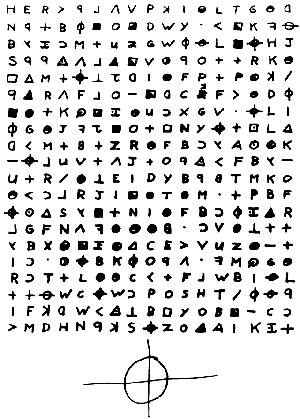 The school bus threat prompted an understandable outpouring of alarm, considering the Zodiac's track record. The police urged the Chronicle to withhold the letter for a week, while they discreetly began coaching bus drivers on how to respond in the event of an attack. When the letter was finally published, the story became a national phenomenon.
The school bus threat prompted an understandable outpouring of alarm, considering the Zodiac's track record. The police urged the Chronicle to withhold the letter for a week, while they discreetly began coaching bus drivers on how to respond in the event of an attack. When the letter was finally published, the story became a national phenomenon. 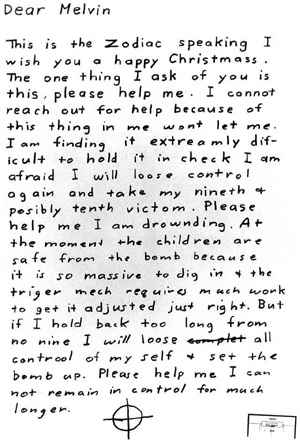 At the end of 1969, the killer sent a Christmas card to San Francisco personal injury attorney Melvin Belli, along with another piece of the cab driver's bloody shirt, in order to establish its veracity. The letter was markedly different in tone from those that preceded it.
At the end of 1969, the killer sent a Christmas card to San Francisco personal injury attorney Melvin Belli, along with another piece of the cab driver's bloody shirt, in order to establish its veracity. The letter was markedly different in tone from those that preceded it. 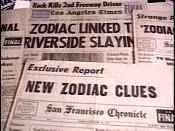 Although the bodies had stopped visibly accumulating, the letters continued to come. In April of 1970, Zodiac sent out a new cipher which he claimed contained his name. The cipher was never cracked. Subsequent letters repeated the school bus threat, with an added twist. The killer claimed he would cancel the bus bombing if the people of San Francisco wore buttons with his crossed-circle emblem.
Although the bodies had stopped visibly accumulating, the letters continued to come. In April of 1970, Zodiac sent out a new cipher which he claimed contained his name. The cipher was never cracked. Subsequent letters repeated the school bus threat, with an added twist. The killer claimed he would cancel the bus bombing if the people of San Francisco wore buttons with his crossed-circle emblem. 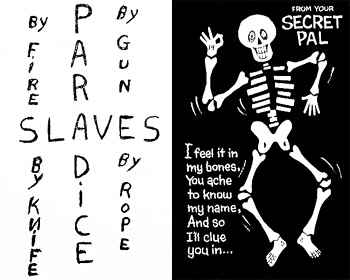 Without specific claims of responsibility, the Zodiac's continuing "rampage" was difficult to verify. A Halloween card sent to a Chronicle reporter upped the victim tally to 14, and a subsequent letter to the L.A. Times in March of 1971 claimed 17. Around the end of 1970, the Chronicle received a letter suggesting they look into the 1968 Riverside murder, with its collection of letters and taunts.
Without specific claims of responsibility, the Zodiac's continuing "rampage" was difficult to verify. A Halloween card sent to a Chronicle reporter upped the victim tally to 14, and a subsequent letter to the L.A. Times in March of 1971 claimed 17. Around the end of 1970, the Chronicle received a letter suggesting they look into the 1968 Riverside murder, with its collection of letters and taunts. 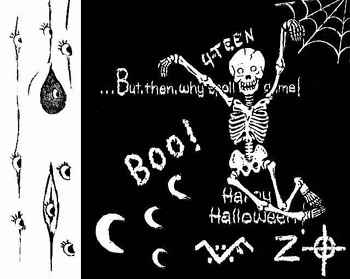 The letter was not signed with the crossed circle, nor opened with the trademark phrase, "This is the Zodiac speaking," but it was authenticated by handwriting experts. After the receipt of this letter, a spate of follow-ups emerged, but none could be authenticated, and none of them seemed to reflect the earlier subject matter. Some of the letters had similar handwriting characteristics but omitted the spelling errors, which suggested to some that Zodiac's bad spelling may have been a red herring designed to throw off any would-be profilers.
The letter was not signed with the crossed circle, nor opened with the trademark phrase, "This is the Zodiac speaking," but it was authenticated by handwriting experts. After the receipt of this letter, a spate of follow-ups emerged, but none could be authenticated, and none of them seemed to reflect the earlier subject matter. Some of the letters had similar handwriting characteristics but omitted the spelling errors, which suggested to some that Zodiac's bad spelling may have been a red herring designed to throw off any would-be profilers. 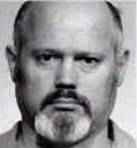 The most closely studied suspect was a Vallejo schoolteacher named Arthur Leigh Allen, who was quite the excellent suspect on the face of it. A weapons nut who told acquaintances his favorite book was the people-hunting classic The Most Dangerous Game, and he reportedly wore a Zodiac-brand watch—sporting the company's logo, a circle with a cross through it.
The most closely studied suspect was a Vallejo schoolteacher named Arthur Leigh Allen, who was quite the excellent suspect on the face of it. A weapons nut who told acquaintances his favorite book was the people-hunting classic The Most Dangerous Game, and he reportedly wore a Zodiac-brand watch—sporting the company's logo, a circle with a cross through it. 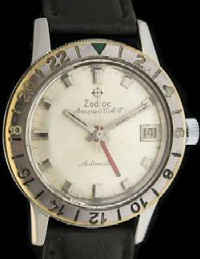 A surviving Zodiac victim picked Allen out of a line-up (about 20 years after the attack had taken place). And the confirmed Zodiac letters came to a crashing halt after Allen was arrested on a charge of child molestation in 1974 and spent a couple years in prison.
A surviving Zodiac victim picked Allen out of a line-up (about 20 years after the attack had taken place). And the confirmed Zodiac letters came to a crashing halt after Allen was arrested on a charge of child molestation in 1974 and spent a couple years in prison.